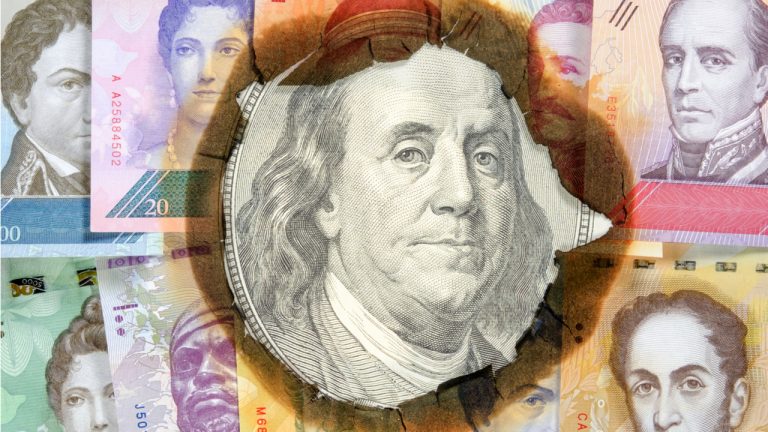Venezuelan Currency Plunges Almost 40% Against the US Dollar, Analysts Cite Crypto Drought as Part of the Problem

The Venezuelan fiat currency, the bolivar, has lost almost 40% in its exchange rate against the U.S. dollar in a month. According to reports, the seasonal payments that the government has to make, and the lack of liquidity of the government to intervene in the currency market are part of the equation leading to this, however, some also include crypto as part of the problem.
Venezuelan Currency Takes a Nosedive
The Venezuelan currency, the bolivar, has been losing its value at an alarming rate after enjoying a period of relative stability recently. The currency has lost almost a 40% against the U.S. dollar in parallel markets, with citizens being alarmed at the accelerated pace of the devaluation. According to the popular price index Monitordolar, each dollar had a price of 9.05 bolivares on Oct. 25. The exchange rate increased to 12.63 bolivares per dollar on No. 26.
There are several explanations for this plunge. According to analysts, this nosedive was expected due to the elevated spending that is common in the Christmas season, a consequence of the elevated liquidity put into the market due to the bonuses and payments that the government and other companies deliver to workers.
This is the part of the theory that Venezuelan economist Jose Guerra has formulated on this issue. Guerra stated:
Demand for bolivars has fallen due to high inflation so when bolivars go into circulation, the public turns to buy goods and dollars to hedge against inflation and devaluation.
Asdrubal Oliveros, head of Ecoanallitica, an economics research firm, also explains that the Central Bank of Venezuela has not been able to intervene by injecting liquidity into the official exchange market. This is due to the lack of dollar inflows for different causes, including sanctions that difficult the movement of these funds that are mostly collected in cash for the sale of oil. In August, the Venezuelan currency also lost 35% of its value against the dollar in just one week.
Crypto’s Influence
However, apart from the usual suspects, Oliveros also believes that there is a crypto element that makes this situation more severe. Oliveros states that most of the parallel currency market, which does not depend on government intervention, was currently being fed by market makers that used cryptocurrency exchanges as a way of injecting these funds into the country.
However, due to the ongoing downtrend that the cryptocurrency market faces, and the lack of confidence in centralized exchanges associated with the downfall of FTX, one of the biggest cryptocurrency exchanges in the world, these market makers have limited their exposure, leaving the market illiquid and contributing to the scarcity of dollars.
The economist expects the exchange rate to keep rising as these problems go bigger in the next few days, qualifying the situation as a “perfect storm” for devaluation to keep growing.
What do you think about the recent plunge of the Venezuelan Bolivar against the U.S. dollar? Tell us in the comments section below.
from Bitcoin News https://ift.tt/zNKZ4nh
Comments
Post a Comment